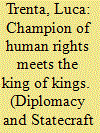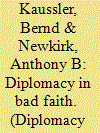| Srl | Item |
| 1 |
ID:
124191


|
|
|
|
|
| Publication |
2013.
|
| Summary/Abstract |
Building on the recent re-discovery of the Iranian Revolution, this analysis examines the policies of the Carter Administration and their effects on Iran and the Iranian opposition. Starting with Jimmy Carter's election and hopes for a new era in American-Iranian relations, there occurred the progressive creation and expansion of a rift between the Carter Administration and the Iranian opposition. This rift was exacerbated by stubborn American support for an increasingly weak Shah, and by the complete unwillingness, both in Washington and at the American Embassy in Tehran, to meet with opposition members, let alone with Ayatollah Ruhollah Khomeini. In this sense, the horizon of the analysis of the origins of the Iran hostage crisis is expanded with a longer-term perspective. The taking of the hostages represented the final act of a troubled relationship that had probably begun before Carter took office.
|
|
|
|
|
|
|
|
|
|
|
|
|
|
|
|
| 2 |
ID:
114171


|
|
|
|
|
| Publication |
2012.
|
| Summary/Abstract |
American-Iranian relations have always been the most significant variable in Iran's nuclear programme, yet, in the absence of direct diplomatic communication, have never been addressed during multilateral negotiations. Since 1979, misperceptions of each other's intentions and capabilities have prevented Iran and the United States from escaping an ambiguous "cold war" relationship. The decision of the Obama and Ahmadinejad governments to open negotiations in Switzerland in Autumn 2009 marked the first bilateral high-profile meeting between both countries in over thirty years. At this time Iran was dealing with the effects of its June presidential elections, which was Teheran's greatest crisis of legitimacy since the Islamic Revolution. In addition, Iran's power elite was informed by a siege mentality vis-à-vis its own people and the international community. Also at this time, the Barack Obama Administration decided to engage Teheran directly. The Iranian government failed to reciprocate American initiatives. The breakdown of talks has, in turn, produced a new United States-sponsored containment doctrine against Iran. Whilst Washington may have shed an exclusive reliance on belligerency, as was the case under President George W. Bush, coercion remains the basis of Iran policy. Within two years after the Obama Administration began experimenting with "two-track" diplomacy, the situation has returned to mutual hostility. The United States and Iran are conducting diplomacy with each other in bad faith.
|
|
|
|
|
|
|
|
|
|
|
|
|
|
|
|